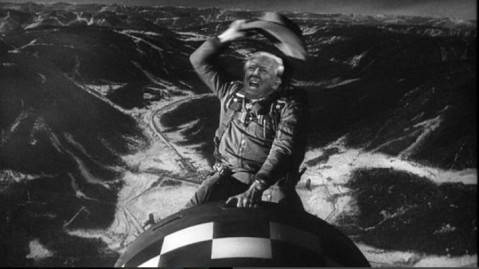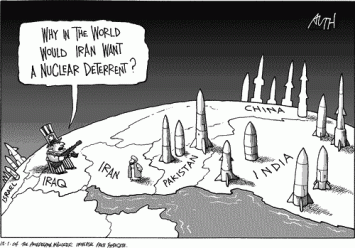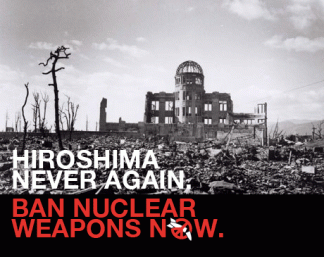World moves to ban nuclear weapons as U.S. flouts obligations, moves to revamp arsenal

Donald Trump as Dr. Strangelove
Governments from Afghanistan to Zimbabwe are pressing for a new legally binding instrument to prohibit nuclear weapons, and will convene later this month in New York to launch historic negotiations toward this end. Noting that the negotiations are proceeding at an “unprecedented” pace, United Nations Conference President Elayne Whyte Gómez said in February that the rapid progress “reflects the urgency that Member States attach to the need to realize progress in the area of nuclear disarmament.”
While previous efforts to ban nuclear weapons have been considered non-starters due to the refusal of nuclear-armed states to adhere to verification procedures, the new treaty effort avoids such pitfalls by focusing instead on establishing unambiguous international norms that would make these weapons politically untenable.
As the Nuclear Threat Initiative explains it,
The Nuclear Weapons Ban is an initiative to prohibit the use, possession, development, testing, deployment and transfer of nuclear weapons under international law. Unlike prior efforts at comprehensive nuclear disarmament, notably the proposed Nuclear Weapons Convention, a treaty banning nuclear weapons would not include dismantlement and disarmament verification procedures. As such, its proponents argue, the negotiation of a ban treaty does not require the participation of the nuclear weapons possessors.
Advocates of a ban treaty believe that nuclear weapons are incompatible with international law. First, as a consequence of their destructive power and radioactive fallout, nuclear weapons inherently violate several articles of the Geneva Conventions meant to protect the victims of international conflicts. Second, many non-nuclear weapons states and disarmament advocates believe that states possessing nuclear weapons have been unwilling to pursue good-faith negotiations mandated by the Treaty on the Non-Proliferation of Nuclear Weapons (NPT).
Proponents see the nuclear weapons ban treaty as a measure to close this perceived “legal gap” in international law, and to encourage an international norm against nuclear weapons.
Standing in the way of this goal, of course, is the United States and other nuclear-armed powers. While the nuclear powers either voted against launching these negotiations – or, as in the case of China, abstained – the U.S. opposition carries additional weight because so many countries around the world consider themselves shielded under the U.S. nuclear umbrella. (Australia voted against launching the negotiations on these grounds, for example.)
The United States also has a special responsibility since it is the nation responsible for inventing these heinous weapons and the only country in the world that has ever used them, dropping two atomic bombs on Japan in 1945, which killed at least 129,000 people and as many as 250,000.
In voting against the launching of treaty negotiations in October 2016, the U.S. explained its position by asserting that it has been “steadily reduc[ing] the role and number of nuclear weapons in a way that maintains strategic stability and creates the conditions and opportunities for further progress.”
In its usual self-serving manner, the U.S. claimed that it is working diligently toward disarmament “without headlines or fanfare,” and the sort of legally binding instrument as being proposed will complicate those efforts:
[T]he United States does not accept the premise underlying the call to negotiate a legally binding instrument to prohibit nuclear weapons found in L.41 and L.24, and while we respect the views of the proponents we disagree with the practicality of their approach and are concerned with the negative effects of seeking to ban nuclear weapons without consideration of the overarching international security environment. We understand and share the disappointment of others with the pace of progress. We must continue to support an approach to reductions which builds upon decades of pragmatic steps to reduce the role and number of nuclear weapons. In our view, diverting focus from this proven course in favour a nuclear weapons ban would be both polarizing and would forsake longstanding principles of credible nuclear disarmament, such as verifiability and is not the recipe for success when dealing with nuclear weapons.
What the U.S. fails to acknowledge is that those “decades of pragmatic steps” have woefully failed to achieve what is needed, which is a complete global ban on nuclear weapons, considering that these weapons, in all likelihood, will end up being used somewhere in the world sooner or later – either intentionally or by mistake.
 It also fails to recognize the fact that the United States and other nuclear powers are already in violation of their international obligations on disarmament, which is a responsibility required by the 1968 Nuclear Non-Proliferation Treaty. It is partially out of frustration regarding the U.S. obstinacy and its decades-long shirking of international commitments that so many countries have decided to take steps to ban these weapons unambiguously and comprehensively once and for all.
It also fails to recognize the fact that the United States and other nuclear powers are already in violation of their international obligations on disarmament, which is a responsibility required by the 1968 Nuclear Non-Proliferation Treaty. It is partially out of frustration regarding the U.S. obstinacy and its decades-long shirking of international commitments that so many countries have decided to take steps to ban these weapons unambiguously and comprehensively once and for all.
Indeed, as the Nuclear Non-Proliferation Treaty Review Conference reminded states parties to the treaty in 2010:
The Conference recalls that the overwhelming majority of States entered into legally binding commitments not to receive, manufacture or otherwise acquire nuclear weapons or other nuclear explosive devices in the context, inter alia, of the corresponding legally binding commitments by the nuclear-weapon States to nuclear disarmament in accordance with the Treaty.
The Conference admonished nuclear-armed countries such as the United States for failing to live up to their end of the NPT bargain:
The Conference, while welcoming achievements in bilateral and unilateral reductions by some nuclear-weapon States, notes with concern that the total estimated number of nuclear weapons deployed and stockpiled still amounts to several thousands. The Conference expresses its deep concern at the continued risk for humanity represented by the possibility that these weapons could be used and the catastrophic humanitarian consequences that would result from the use of nuclear weapons.
In deciding to launch a new treaty negotiation process, the United Nations General Assembly also alluded to the failures of nuclear powers to live up to obligations under the NPT noting that “additional efforts” may be necessary. Specifically the General Assembly:
Recommend[ed] that additional efforts can and should be pursued to elaborate concrete effective legal measures, legal provisions and norms that will need to be concluded to attain and maintain a world without nuclear weapons, reaffirms the importance of the Treaty on the Non-Proliferation of Nuclear Weapons and the commitments made therein, and considers that the pursuit of any such measures, provisions and norms should complement and strengthen the nuclear disarmament and non-proliferation regime, including the three pillars of the Treaty
Rather than pursuing good-faith efforts toward disarmament as called for by the NPT, the United States has instead engaged in extensive atomic rebuilding and refurbishing of the U.S. nuclear force to the tune of an estimated trillion dollars in the coming decades. The administration of Barack Obama supported disarmament rhetorically, but simultaneously pursued polices to entrench the U.S. as a nuclear-armed power, leading to Boston Globe columnist James Carroll to remark in late 2014,
Mark these days. A long-dreaded transformation from hope to doom is taking place as the United States of America ushers the world onto the no-turning-back road of nuclear perdition. Once, we could believe there was another way to go. Indeed, we were invited to take that path by the man who is, even today, overseeing the blocking of it, probably forever.
With Donald Trump in the White House, the situation is even more ominous, as he signals that he will pull out of nuclear weapon reduction treaties such as the New START agreement with Russia, and indicates that the U.S. will pursue absolute nuclear dominance over the world. “If countries are going to have nukes, we’re going to be at the top of the pack,” said Trump last month, flying in the face of decades of tepid U.S. efforts to pursue modest reductions in nuclear arsenals around the world.
Underlining this point and demonstrating his complete disregard for nuclear stability and international norms, Trump told MSNBC’s Morning Joe “let it be an arms race,” essentially egging on the rest of the world to arm themselves to the teeth with weapons capable of ending all life on earth within minutes. He also tweeted that the U.S. should “greatly strengthen and expand its nuclear capability until such time as the world comes to its senses regarding nukes.”
With these sorts of flippant remarks in mind, the Bulletin of Atomic Scientists, which since 1947 has been periodically raising alarm bells over looming nuclear catastrophe, set its “Doomsday Clock” ahead 30 seconds in January 2017 to “two and a half minutes to midnight”:
For the last two years, the minute hand of the Doomsday Clock stayed set at three minutes before the hour, the closest it had been to midnight since the early 1980s. In its two most recent annual announcements on the Clock, the Science and Security Board warned: “The probability of global catastrophe is very high, and the actions needed to reduce the risks of disaster must be taken very soon.” In 2017, we find the danger to be even greater, the need for action more urgent. It is two and a half minutes to midnight, the Clock is ticking, global danger looms. Wise public officials should act immediately, guiding humanity away from the brink. If they do not, wise citizens must step forward and lead the way. See the full statement from the Science and Security Board on the 2017 time of the Doomsday Clock.
Thankfully, although United States’ intransigence continues to remain an obstacle to progress, responsible global leaders are pushing forward with “actions needed to reduce the risks of disaster,” and it is in this spirit that negotiations will begin on the nuclear weapons ban at UN headquarters in New York from March 27 to 31 and again from June 15 July 7.
 Although the U.S. remains opposed to this treaty along with 37 other countries that voted against launching negotiations, the overwhelming majority of the world – 123 nations – have expressed support for banning nuclear weapons once and for all. Many countries that voted to launch negotiations explicitly took issue with the U.S. rationale against the treaty, with Iraq, for example, noting that “negotiations [on risk reduction measures] cannot be an alternative to a convention to expressly prohibit nuclear weapons.”
Although the U.S. remains opposed to this treaty along with 37 other countries that voted against launching negotiations, the overwhelming majority of the world – 123 nations – have expressed support for banning nuclear weapons once and for all. Many countries that voted to launch negotiations explicitly took issue with the U.S. rationale against the treaty, with Iraq, for example, noting that “negotiations [on risk reduction measures] cannot be an alternative to a convention to expressly prohibit nuclear weapons.”
Peru concurred, stating, “It is only through a prohibition on the use and possession of nuclear weapons that we will achieve elimination.” The Philippines pointed out that “while we have treaties banning chemical and biological weapons, we do not have one for the deadliest [weapons] of them all. And so work on a treaty that will ban the possession, use or threat of use, acquisition, development and testing of nuclear weapons is the most ideal and correct action.”
South Africa argued that “A prohibition treaty could be a stand-alone treaty which establishes a norm against nuclear weapons through a non-discriminatory prohibition on possession, use, threat of use, acquisition, stockpiling, deployment, as well as assistance, encouragement or inducement of [these] acts.”
Afghanistan said, simply, “We join all peace-loving people in their call for a global treaty to outlaw and eliminate these instruments of human destruction.”
Civil society will be intimately involved in the negotiations process with the International Campaign to Abolish Nuclear Weapons (ICAN), for example, planning to have a large delegation of campaigners present for both negotiating sessions. “We will urge all governments to work in good faith to achieve the strongest, most effective treaty possible,” says ICAN.
Reaching Critical Will (RCW) will report daily from the ban treaty negotiations, and urges people to subscribe to their First Committee Monitor for regular updates.
More information about campaign activities and expectations for the negotiations can be found at www.nuclearban.org.
